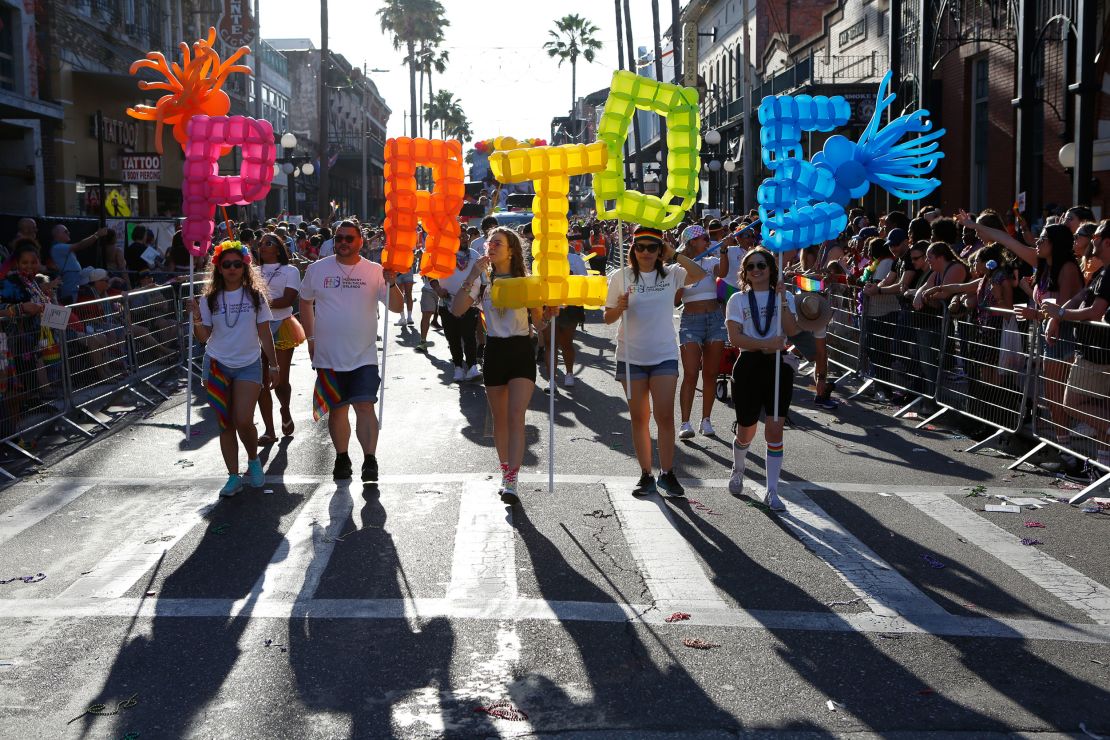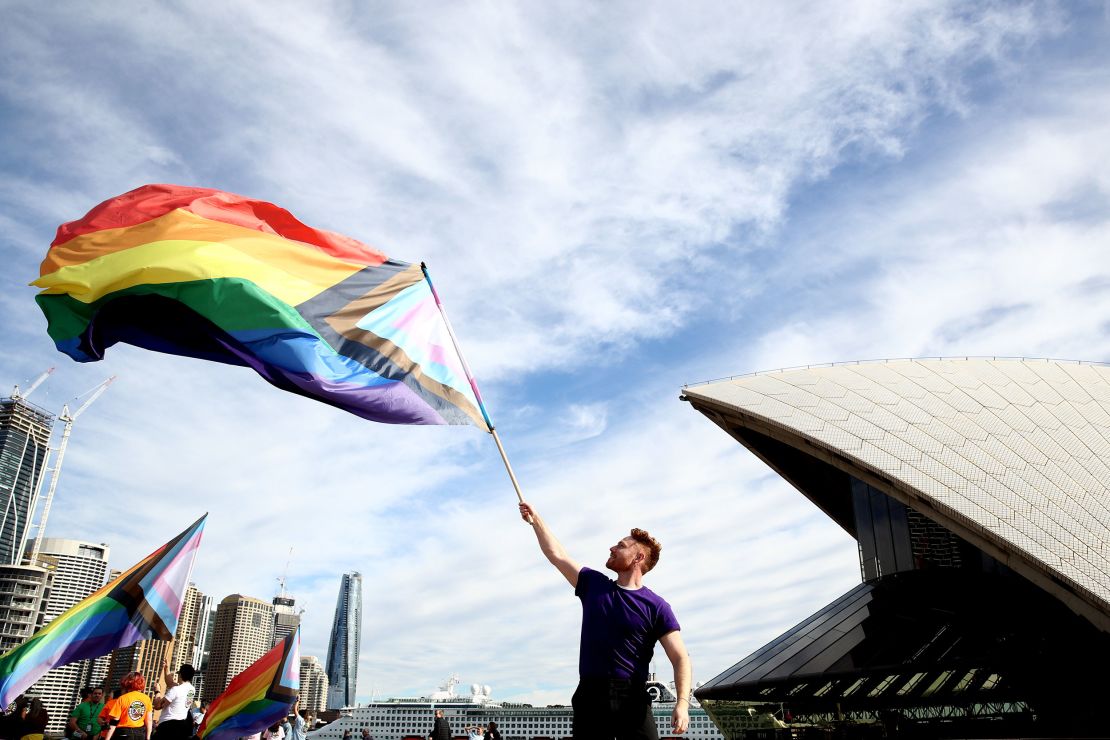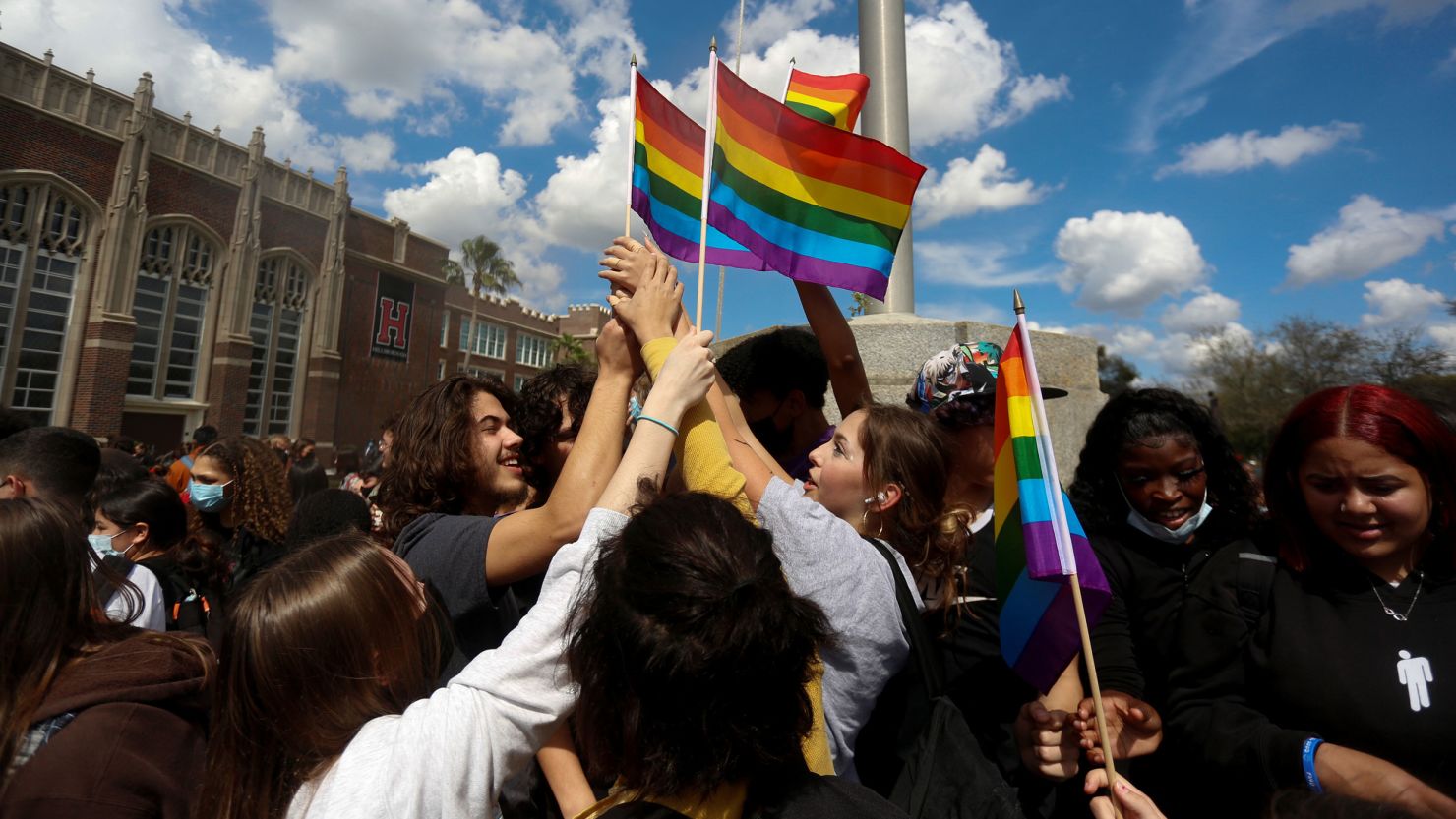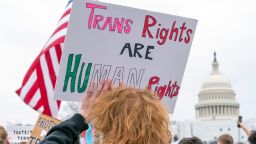Editor’s note: Allison Hope?is a writer whose work has been featured in The New Yorker, The New York Times, The Washington Post, CNN, Slate and elsewhere. The opinions expressed in this commentary are solely those of the author. Read?more opinion?on CNN.
This Pride month feels different.
Florida recently signed a bill into law that allows kids to be forcibly removed from their parents and homes because they are accessing gender-affirming health care.

School districts in many states are banning books and curriculum featuring the rich lives and experiences of LGBTQ people.
Then there are the drag queen witch hunts and claims of “grooming” for letting kids be who they are.
It can be terrifying for those of us in the LBGTQ community and our loved ones. But l know hope isn’t lost — that is, if you can turn that anger into fuel to fight for all of us to live safely, fairly and freely.
“To support our most marginalized, we must start by rising up and calling out injustice and hateful rhetoric,” Melanie Willingham-Jaggers, executive director of GLSEN, which focuses on supporting LGBTQ youth and inclusive education, told me.
“It’s crucial that we join our communities to speak out against bills that include curriculum and book bans and vote for down-ballot candidates like school board members and state legislators who support inclusive education.”
That sounds good, but how do we do that when there are more than 400 pieces of anti-LGBTQ legislation proposed, pending or passed across several states this year alone? I promise there are some simple and immensely helpful ways in which LGBTQ people and allies can take action in June and every month.
Here’s how to clap back against the anti-LGBTQ vitriol this Pride:
1. Be an active upstander: When a school, workplace or other establishment gets squeamish about running an LGBTQ program because of the current sociopolitical climate, challenge them. Point out the homophobic or transphobic undertones in their decision and help guide them to a place where LGBTQ representation and visibility is supported. Commit to being an active upstander. Call out microaggressions or subtle misconceptions in real time when they’re uttered and help create an environment where injustice gets checked and people are more aware of how their actions and words have the power to demean or to further justice and equity.

Encourage passive allies to step up and become active ones. Change your social media profile image to the?Progress Pride flag?and consider that a starting point, not the sum total of expressed allyship. Honor that symbol by calling out misinformation about LGBTQ people that others share on social media. Counter hate with facts and defend LGBTQ people who are getting bullied or harassed, online or off.
2. Take to the streets: Students walked out?of school last year and more recently in April to protest the state’s “Don’t Say Gay” law;?drag queens marched?at the Florida Capitol in Tallahassee, also in April. Make noise and create headlines with (legal) physical demonstrations of resistance to capture attention and raise awareness of the dire urgency of the moment, all that’s at stake and the need to act. Even a small number of people in a small town can make local news. Turning out for a pride march or event throughout June is one good way to show solidarity. Show up on other days, too, when groups gather at offices of local elected officials or school board meetings. Bring signs, make speeches and get others to activate.
3. Lobby as hard as you love us: When an anti-LGBTQ bill is introduced, constituents can reach out to lawmakers and share why they do not support the legislation. Stay on top of the legislative landscape and learn about the bills on the docket and their implications if passed. Make a phone call, send an email or visit in person and lobby your legislators to let them know you do not support the bill. Write an op-ed or letter to the editor for the local paper in response to an article about an anti-LGBTQ bill that’s under consideration or a piece that is misinformed or lacking in nuance. Make the case for how it will harm people, economies and communities. Bring in unique perspectives and personal stories — affirming religious leaders, parents, colleagues — to help humanize and show the strength and diversity of LGBTQ allyship.

If you don’t know where to begin with lobbying, look to an LGBTQ or civil rights group doing the hard work on the ground. Volunteer, get trained, donate to a nonprofit’s political advocacy arm, help run an event or get the word out to bring in critical funds to support its mission.
4. Commit to learning and teaching: Even members and strong allies of the LGBTQ community can benefit from fresh learning. After all, the LGBTQ community is anything but a monolith — there are so many diverse forms of representation and a landscape that is quickly evolving. Plenty of well-intentioned allies still don’t know or understand the rainbow alphabet of diverse sexual and gender identities and experiences or how to suss out what stories are accurate and which are downright propaganda. One important stop is GLSEN’s pronoun guide as well as GLAAD’s transgender resources, and the resource center at the Trevor Project, which focuses on anti-bullying and suicide prevention for LGBTQ youth.
Reading and sharing books that feature LGBTQ characters or themes is a good way to get steeped in queer lives and deepen empathy. Try classics such as Virginia Woolf’s “Orlando” and “The Picture of Dorian Gray” by Oscar Wilde or more recent works such as Janet Mock’s “Redefining Realness” or Paisley Currah’s “Sex Is as Sex Does: Governing Transgender Identity.”
Young adults can check out Maia Kobabe’s “Gender Queer,” the most banned book in America in 2022, and André Aciman’s “Call Me by Your Name,” about a romance between two young men. Younger readers (and their grownups) can learn from beautiful books that speak to our collective humanity, such as “You Need to Chill!” by Juno Dawson, “Julián Is a Mermaid” by Jessica Love and “What If Wilhelmina” by Joseph Belisle, among others.
It’s also not a bad time to support brands that are supportive of the LGBTQ community. Take Disney, which continues to include LGBTQ representation in its movies and shows and has come under attack by Florida Gov. Ron DeSantis, yet is still standing its ground in support of LGBTQ people.
Get Our Free Weekly Newsletter
- Sign up for CNN Opinion’s newsletter
- Join us on Twitter and Facebook
5. Honor intersectionality: LGBTQ people aren’t a monolith. We also identify in other diverse ways, including by race, ethnicity, age, income level, body size and ability, geography and more. The intersectionality of our identities can compound the challenges, disparities and discrimination we face. Allies should acknowledge that a queer person’s LGBTQ identity may not be the most prominent part of how they define themselves or even make the top five. Additionally, some LGBTQ people move through the world with more privilege than others because of those intersectional identities. Approach people and situations with an open mind and don’t make assumptions about them because of their perceived identity.
For every handful of rainbow glitter we throw at a fabulous pride celebration, let’s spend time helping to correct the record and defend LGBTQ family, friends and community members against the onslaught of attacks. Don’t underestimate the inherent power of that bedtime story, that emailed article, that conversation struck at the bus stop or dinner table. It may just be the catalyst that tips us into a safer, brighter and more equal future.



